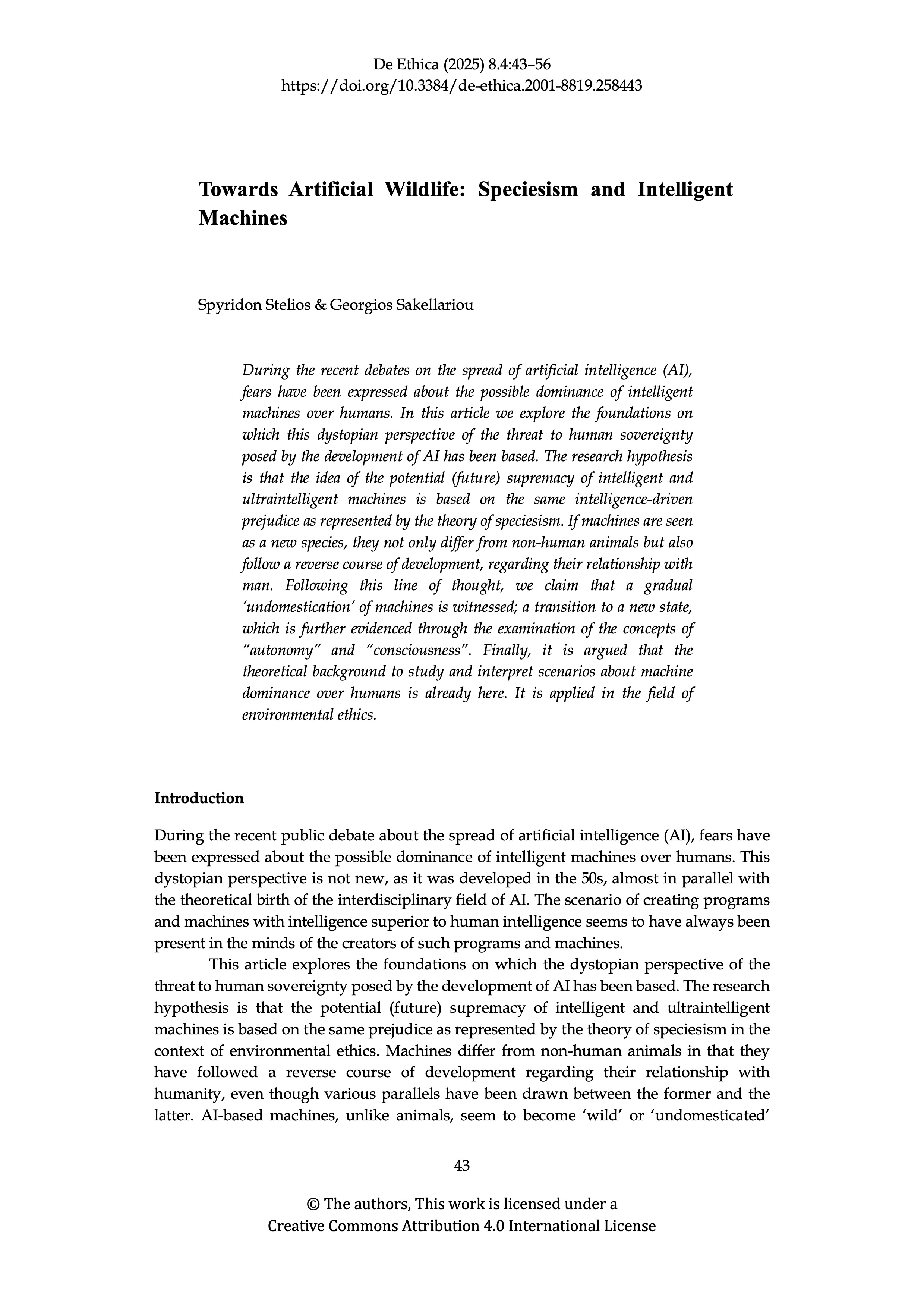Towards Artificial Wildlife: Speciesism and Intelligent Machines
DOI:
https://doi.org/10.3384/de-ethica.2001-8819.258442Keywords:
speciesism, domestication, non-human animals, artificial intelligence, environmental ethics, autonomy, consciousnessAbstract
During the recent debates on the spread of artificial intelligence (AI), fears have been expressed about the possible dominance of intelligent machines over humans. In this article we explore the foundations on which this dystopian perspective of the threat to human sovereignty posed by the development of AI has been based. The research hypothesis is that the idea of the potential (future) supremacy of intelligent and ultraintelligent machines is based on the same intelligence-driven prejudice as represented by the theory of speciesism. If machines are seen as a new species, they not only differ from non-human animals but also follow a reverse course of development, regarding their relationship with man. Following this line of thought, we claim that a gradual ‘undomestication’ of machines is witnessed; a transition to a new state, which is further evidenced through the examination of the concepts of “autonomy” and “consciousness”. Finally, it is argued that the theoretical background to study and interpret scenarios about machine dominance over humans is already here. It is applied in the field of ethics and in particular, of environmental ethics.
References
Aristotle. Complete Works vol. 1, The Revised Oxford Translation, edited by Jonathan Barnes. Princeton, N.J.: Princeton University Press, 1991.
Perrigo, Billy. ‘The New AI-Powered Bing Is Threatening Users. That’s No Laughing Matter’, Time (17 February 2023), online at, https://time.com/6256529/bing-openai-chatgpt-danger-alignment/ (accessed 2024-08-31).
Bostrom, Nick. Superintelligence: Paths, Dangers, Strategies. Oxford, UK: Oxford University Press, 2014.
Dennett, Daniel C. ‘Autonomy, Consciousness, and Freedom’, The Amherst Lecture in Philosophy 14 (2019), pp. 1–22.
Dennett, Daniel C. Brainstorms: Philosophical Essays on Mind and Psychology, Fortieth Anniversary Edition. Cambridge, MA: MIT Press, 2017.
Dennett, Daniel C. ‘When Philosophers Encounter Artificial Intelligence’, Daedalus 117:1 (1988), pp. 283-295.
Good, Irving John. ‘Speculations Concerning the First Ultraintelligent Machine’, Advances in Computers 6 (1966), pp. 31–88.
Grey, Sarah and Cleffie, Joe. ‘Peter Singer’s race problem’, Jacobin (8 June 2015), online at, https://jacobin.com/2015/08/animal-rights-cecil-the-lion-peter-singer-speciesism (accessed 2023-05-17).
Gunkel, David J. The Machine Question: Critical Perspectives on AI, Robots, and Ethics. Cambridge, MA: The MIT Press, 2012.
Himma, Kenneth Einar. ‘Artificial Agency, Consciousness, and the Criteria for Moral Agency: What Properties Must an Artificial Agent Have to be a Moral Agent?’ Ethics and Information Technology, 11:1 (2009), pp. 19-29.
Ingold, Tim. ‘From Trust to Domination: An Alternative History of Human Animal Relations’, in Animals and Human Society: Changing Perspectives, edited by Aubrey Manning and James Serpell. London: Routledge, 1994, pp. 1-22.
O’Connor, Timothy and Franklin, Christopher. ‘Free Will’, in The Stanford Encyclopedia of Philosophy (Winter 2022 Edition), edited by Edward N. Zalta and Uri Nodelman, online at, https://plato.stanford.edu/archives/win2022/entries/freewill/ (accessed 2024-08-31).
Putnam, Hilary. ‘Artificial Intelligence: Much Ado About not Very Much’, Daedalus, 117:1 (1988), pp. 269-281.
Putnam, Hilary. ‘Robots: Machines or artificially created life?’ Journal of Philosophy 61:21 (1964), pp. 668–691.
Shipman, Pat. The Animal Connection. New York: W. W. Norton & Company, 2011.
Singer, Peter. ‘All Animals Are Equal’, Philosophic Exchange 5:1 (1974), pp. 103-116.
Turing, Alan Mathison. ‘Computing Machinery and Intelligence’, Mind 59 (1950), pp. 433– 460.
University of Oxford. Flight of the bumble bee is based more on brute force than aerodynamic efficiency. ScienceDaily (10 May 2009), online at https://www.sciencedaily.com/releases/2009/05/090507194511.htm (accessed 2023-05-17).

Downloads
Published
How to Cite
Issue
Section
License
Copyright (c) 2025 Spyridon Stelios, Georgios Sakellariou

This work is licensed under a Creative Commons Attribution 4.0 International License.
